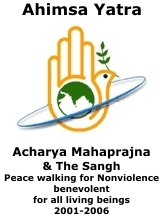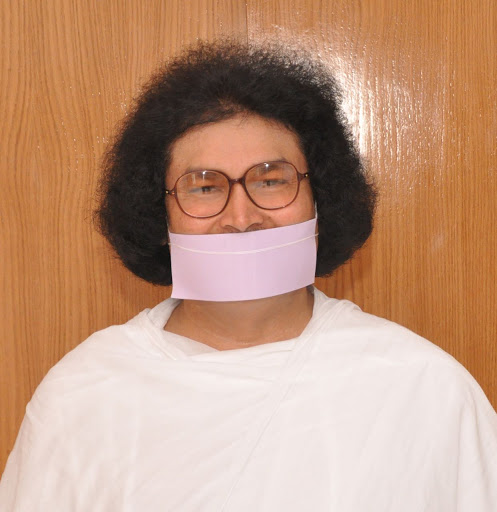
Acharya Mahaprajna started his 4000 km peace walking trip at the age of 82 in December 2001. In honour of the 2600th birth anniversary of Lord Mahavira, the 24th Tirthankara he wants to spread the message of non-violence (Ahinsa or Ahimsa). His aim is to create an awareness for ethical values in the public. The peace walking trip could only be realised by his decisiveness and his courage and will reach four states of the Indian Union, Rajasthan, Gujarat, Maharashtra, and Madhya Pradesh.
Jain Svetambara Terapanth Munis are rambling ascetics. They don’t use means of transportation and are moving on foot only. They make 7 up to 30 km by day according to their age or weather conditions. Senior monks get support by a four wheels vehicle moved by young monks if necessary. Acharyashree Mahaprajnaji is helped this way also. [ Editors ]
It started on December 5th in Rajasthan at a temperature of 5°C. At his arrival in Gujarat being afflicted by a wave of violence [since end of February 2002. Editors] the temperature was 45°C and the communities were burning. Between Muslims and Hindus there was a situation similar to civil war!
People would not have believed the miracle if they had not witnessed it. Even today the people are looking for reasons why the scenario of violence in Gujarat had changed.
In the Godhra station people were burnt alive and later many people were shot in the temple of Akashardham. Thousands of people were killed. The bereaved and homeless sought refuge in rescue camps. The economy broke down. The whole world condemned these incidents. The Prime Minister of India asked himself in public how he can show his face to the world in the light of such incidents.
Yet, just a few months later people all around the world were surprised at the tolerance displayed by the people after the incidents of Akshardham and Godhra. The governance of the state was in the hands of the same leaders, the same police, and the same people and yet there was a great difference in the sequence of events- no loss of life, no curfew, no financial losses and terror-stricken refuge rescue camps.
Why this change? What brought around this behaviour in the period of six months between the violent incidents of Godhra to Akshardham?
This miraculous turn of events is in no small measure due to the Ahimsa Yatra of Acharyashree Mahaprajna. It seems unbelievable and so some people hesitate to give credit. At the same time others ask, even if they have to give credit, as to what could possibly be the divine powers in Acharyashree that caused such a turn of events.
Acharya Mahaprajna, the philosopher and spiritual Seer, knows and applies the divine truth that war is first initiated in the minds of the people. It finds conclusions in the battlefield or in war. Acharyashree launched this Yatra of visiting many small villages, towns and cities primarily to communicate with the people, to address the core of their hearts. According to him, traits of violence can be found in the mind. He believes that the right type of meditation can bring about a change in this trait, a change in the mental attitude and this is what he is trying to effect during the course of the Yatra. Can we not see a snapshot of this in the aftermath of the Akshardham incident?
Generally thought and practice are defined as two banks of stream which never meet. Moral values are to bridge this gap. Acharyashree seeks to install values of peace and Ahimsa during the Yatra.
It is difficult for the new generation to believe that the frail dhoti clad Gandhi Ji could actually harness a whole battalion without a single weapon. Today after 50 years it is difficult to believe that a Gandhi like man has appeared to appease the masses in Gujarat when it is facing difficult times in the name of the religion.
In May 2002, Acharya Mahaprajna led his followers of a few hundred monks and nuns into Gujarat from Rajasthan. At that time innumerable followers and disciples pleaded with the great monk not to enter the territory plagued with the communal violence. Acharyashree was amused. He said, “Only a fearless person can talk of ahimsa. If the followers of ahimsa succumb to fear what happens to the fate of a common man? I will go to Gujarat because there is an utmost need for Ahimsa.”
He stayed two months at Ahmedabad/Gujarat. However, the people of Gujarat were still nervous. There was insecurity and fear in their minds. They were divided into two parts; they either put a "786" or an "Om" to symbolize their religion and thereby seek some protection and security.
Communal unity was not a topic of discussion in those times for hatred was reigning. But Acharya Mahaprajna was undaunted. He addressed a seminar in Sidhpur, Gujarat, and another one in the world famous business centre of Unjha. As soon as the Yatra reached Ahmedabad a communal unity conference was organized to keep unity and peace. Dr. Roop Kumar Agarwal, founder of Chandermani Hospital organized these conference. The message of peace exuded from the spiritual leader with his very presence and more with his fearless and clear enunciation of human values.
Then there came a time when the media got very worried. The Jagannath Rath Yatra of the Hindu community was to be taken out. Will there be violence? Should the Rath Yatra be stopped? Acharya Mahaprajna clarified the issue, “ This is a procession that has taken place every year for the past 112 years. To stop it this year would leave a negative impact on the minds of people.” So he himself came forward to support it. He was so simple and clear that the procession was whole-heartedly welcomed by the Muslim community. After this success people of Gujarat began calling him, "a messenger of humanity and peace, the second Gandhi of Gujarat."
Touched and inspired by these efforts of Acharyashree, the President of India, Dr. Abdul Kalam met him ignoring all protocol. Similarly, the deputy Prime Minister Lal Krishna Advani, Congress President and Leader, Smt. Sonia Gandhi, the supreme of RSS, Sh. K.C. Sudarshan travelled to Gujarat and met Acharyashree to discuss the adoption of Ahimsa as a national policy.
Ahimsa is not a mere slogan but a great mission for the seer. He has achieved great success in aborting the Planning Commission's recommendation to open 4000 new slaughterhouses in India.
The whole world, not just our society should feel proud of his contribution to humanity. Our heartiest good wishes for the Ahimsa Yatra as it enters its third year.
When the Ahimsa Yatra had reached Bombay, the president of India, Dr. A. P. J. Abdul Kalam met Acharyashree two times during the two days of his stay there. He seeked his advice in national and international affairs.
On October 13th and 14th the conference ‘Unity of Minds’ headed by Acharyashree and Dr. Abdul Kalam took place in Surat, Gujarat. The projects and activities decided during this conference were noted in the ‘Surat Spiritual Declaration’ [SSD] and signed by all participants on October 15th.
 Acharya Dr. Lokesh Muni
Acharya Dr. Lokesh Muni